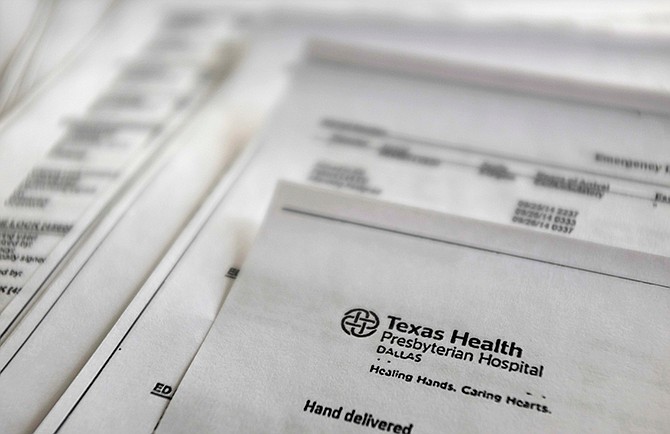Despite five days of intensive treatment, Thomas Eric Duncan's condition was deteriorating.
By the morning of Oct. 2, nurses noticed blood in the Liberian man's urine, and his stools were getting darker. Lab tests revealed worrisome signs of liver and kidney failure. Doctors suspected the 45-year-old welder was slipping into acute respiratory distress.
Then, suddenly, a hopeful sign. Duncan was hungry.
At 3:45 p.m., nurses raised the patient into a sitting position and gave him a snack - a packet of saltine crackers and some Sprite. It wasn't much, but no miracle was too small for the staff at Dallas' Texas Health Presbyterian.
"Patient states that he is 'happy right now,'" the nurse noted in the log.
Six days later, Duncan was gone. The first person ever to be diagnosed with the dreaded Ebola virus on United States soil was the first in this country to die of it.
Grieving and angry family members wonder whether the man they called Eric might have survived had health care workers not sent him home when he first presented himself at the hospital, Sept. 25, and whether doctors really did everything in their power to save him. "We're trying to get to the bottom of it," says Josephus Weeks, Duncan's nephew.
Hundreds of pages of medical records provided to The Associated Press chart the disease's relentless march through Duncan's body and provide an unprecedented look at how Ebola killed despite the aggressive efforts doctors made to save him.
_
On Sept. 28, an ambulance carrying Duncan pulled into the hospital's emergency bay. It was just after 10 a.m.
Not 55 hours earlier, Duncan had come to the same emergency room complaining of a headache and abdominal pain. His temperature spiked to 103 at one point, and on a scale of one to 10, he rated his pain as an eight.
Doctors ran CT scans of his head and abdomen and did extensive blood tests before deciding it must be sinusitis. They sent him home with a course of antibiotics and told him to follow up with a doctor the next day.
A nurse's note said Duncan told her he recently had arrived from Africa. Somehow, that information did not make it to the attending physician.
Now, Duncan was back, only this time his symptoms included vomiting and diarrhea. His temperature was 103.1 degrees.
This time, the nurse's notes made it clear that Duncan had "just moved here from Liberia." This time, the doctor got the message.
"I followed strict CDC protocol," wrote Dr. Otto Javier Marquez-Kerguelen, referring to the U.S. Centers for Disease Control and Prevention guidelines for treating potentially infectious patients. Wearing a mask, gloves and full gown, Marquez-Kerguelen began his examination and took a history.
"Pt states he has not been to any rural areas or funerals recently," he noted. "Pt denies any sick contacts. Pt denies chills. The pt does not do (sic) any other associated signs of sx (symptoms) at this time."
Among the possible diagnoses: malaria, gastroenteritis, influenza and Ebola.
Duncan was put into isolation. The nurses notified county officials; the doctor called the CDC.
By evening, Duncan was suffering from explosive diarrhea, abdominal pain, nausea and projectile vomiting. Efforts to bring down his fever failed.
Three more doctors were put on the case. Duncan received intravenous fluids to counter the dehydration, but there was still no firm diagnosis.
Because Duncan had recently traveled from Liberia, Dr. Gebre Kidan Tseggay noted, "Ebola virus disease should be high on the list" of differential diagnoses.
Shortly before noon on Monday, Sept. 29, Duncan asked the nurse to put him in a diaper, "because he feels too tired to keep getting up to the bedside commode." His fever spiked again to 103, and Duncan was wracked with chills.
"Pt said he just doesn't feel good and doesn't want to stay in the hospital and expressed concern that the doctor had not been here to tell him what was going on," a nurse wrote.
Blood tests showing damage to the liver and kidneys, and fluctuating blood sugar levels kept doctors scrambling. Tests ruled out influenza, hepatitis, parasites and C-diff, the germ notorious for spreading diarrhea in hospitals and nursing homes.
"Feels miserable. Says he is suffering," Dr. Oghenetega Abraham Badidi wrote in the chart. "The patient seems to be deteriorating."
Finally, at 2 p.m. on Sept. 30, doctors received the confirmation that all had been dreading: "Patient has tested positive for Ebola ..." The staff attending to Duncan traded their gowns and scrubs for hazmat suits and attendants would scrub the room with bleach.
By Oct. 1, sepsis had set in. Doctors ordered aggressive IV care in hopes of preventing kidney and liver failure.
Duncan tried to remain upbeat.
"Pt requested to watch an action movie," the doctor noted. "States he is feeling better."
Duncan told his nurse he wanted to try solid food, then refused his lunch tray.
The next morning, Duncan told his attendants that his abdominal pain had lessened. He said he was "trying to keep up good spirits and 'stay strong.'"
But there was now blood in his urine. Worried about his lung function, doctors added advanced antibiotics to Duncan's medication.
That afternoon, he ate his crackers and drank less than 2 ounces of Sprite.
In the morning note on Friday, Oct. 3, a nurse-practitioner wondered, "concern for liver failure?"
Nurses were urged to tempt Duncan with applesauce, bananas and other bland foods; at one point they offer ice cream. A nutritionist wanted to start total parenteral nutrition, a kind of IV feeding used in the severely ill, and the doctors sought advice from the CDC.
That afternoon, a doctor's note declared Duncan's kidney function "much worse."
Stymied, physicians contacted Chimerix, a small pharmaceutical research firm based in Durham, North Carolina. They wanted to try the firm's experimental antiviral drug, brincidofovir.
The Food and Drug Administration gave its blessing.
"They were not holding anything back," said Dr. Amesh Adalja, an infection disease and critical care specialist at the University of Pittsburgh Medical Center who reviewed the records for the AP. "They were trying to support every organ system."
Just after midnight Oct. 4, nurses noted that "patient is restless. Coughing." Duncan's oxygen levels were dropping, and he went into multiple organ failure.
"Patient's condition is life-threatening and without immediate intervention would deteriorate," a doctor wrote. They placed a tube in Duncan's airway to help him breathe.
The body can compensate for a while, Adalja said. "But then "you go over this cliff."
"He's not slowly coming to a wreck, veering off the road. It's crashing," Adalja said.
Later that morning, a shipment of brincidofovir arrived and Duncan got the first dose.
The following day, Sunday, Oct. 5, the Texas doctors consulted with their colleagues at Emory University in Atlanta about additional options. Emory had cared for three Ebola-stricken aid workers airlifted there from West Africa; two had recovered and the other was stable.
One of those survivors, Dr. Kent Brantly, had donated blood for other patients, in hopes that his antibodies might help them fend off the virus. But Brantly's blood was not a match for Duncan's. There would be no transfusion for the Liberian.
_
Monday morning, as doctors increased Duncan's dialysis, Weeks was picking his way across Louisiana in a hail storm. Riding with him were his son, Josephus Jr., Duncan's sister, Mai Wureh, and Duncan's mother, Nowai Korkoyah.
So close in age, uncle and nephew were raised more like brothers.
After more than a week of listening to his uncle's failing voice over the phone from his home north of Charlotte, North Carolina, Weeks decided it was time to go to him.
That evening, hospital staff escorted the family members to a room in the basement of Texas Presbyterian. It was the only way they would be allowed to see Duncan was via closed-circuit television.
"My son is dead!" Korkoyah cried out when she saw him. To Weeks, the immobile, expressionless face was "like a mask."
Haunted by the image of her son with a tube protruding from his mouth, Korkoyah could not sleep that night. When they returned to the hospital with the Rev. Jesse Jackson around noon on Tuesday, the mother declined the doctors' offer to turn on the screen.
Throughout the day, doctors watched helplessly as Duncan's condition continued to deteriorate. His blood pressure was dropping, his fever and carbon-dioxide levels rising.
Wednesday morning, as nurses took Duncan's vital signs, they found his heart rate had dropped into the 40s.
The nurses administered several rounds of atropine and epinephrine in an attempt to bring Duncan back. But he was beyond help.
"No palpable pulse," they noted, "time of death called." It was 7:51 a.m.
Dr. Badidi had just hung up from giving the family an update when he learned of Duncan's death. He called them back "and passed on the sad news."
"Please accept our condolences regarding your loss," James A. Berg, the hospital's interim president, wrote in a letter to Duncan's sister later that day. "The staff at Texas Health Dallas share in your and your family's sorrow."
As infectious in death as he was in life, Duncan's body was cremated.
_
Back in North Carolina, Weeks pored over the stacks of medical records - 1,400 pages in all. He has so many questions:
How could the hospital have sent Duncan home that first day? Why did it take so long to remove the other people from the Dallas apartment where Duncan had been staying when he got sick? Why was Duncan not given the same experimental treatments as Americans with Ebola?
"Four white people got it," Weeks had asked angrily as Duncan languished.
Compounding his grief, Weeks now finds himself having to defend his dead uncle from allegations that he lied to airport authorities about his exposure to the disease.
Duncan's neighbors in Monrovia, Liberia, have said that he was likely exposed to the virus while assisting a pregnant 19-year-old who later died of the disease. But Weeks says his uncle told him he hadn't helped the young woman.
"He would have never come (to the U.S.) if he knew there was even the slightest possibility that he had Ebola," Weeks said.
In the living room of her extended family's comfortable one-story home, Korkoyah weeps for her son. He was, she said, "so kind, so generous."
"I know I can't get my son back," she said. "But I just pray God will give me the strength."
Breed and Schmall reported from Kannapolis, North Carolina, and Neergaard from Washington.


